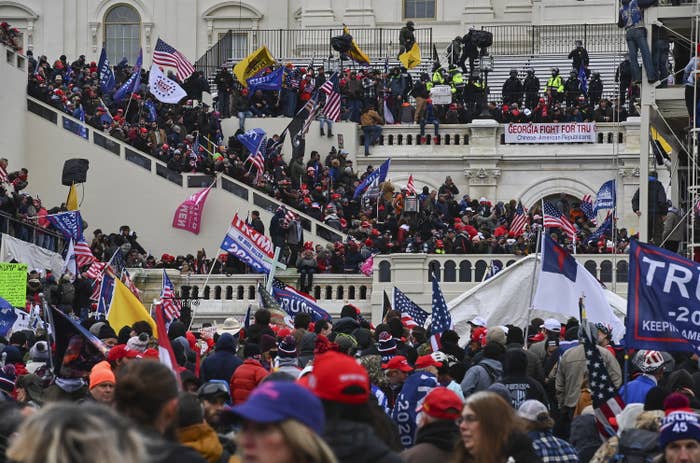
WASHINGTON — A Georgia man pleaded guilty Friday in the Justice Department’s seditious conspiracy case against members of the Oath Keepers extremist group, becoming the second person involved in the blockbuster Jan. 6 prosecution to agree to cooperate with investigators against his codefendants.
Brian Ulrich pleaded guilty to one count of seditious conspiracy and one count of obstructing an official proceeding, both felonies that carry up to 20 years in prison. Ulrich’s estimated sentencing range at this stage of the case is 63 to 78 months in prison; that estimate is meant as a guidepost for the judge and isn’t binding, and if prosecutors are satisfied with Ulrich’s cooperation, they’ve agreed to back his petition for less time behind bars.
Ulrich joins his codefendant Joshua James in cutting a deal with prosecutors; James entered a guilty plea in March. In admitting to seditious conspiracy, both Ulrich and James implicated the rest of their codefendants — a group that includes Oath Keepers founder Stewart Rhodes — in a concerted plot to oppose by force the lawful transfer of presidential power, arguably the most symbolically serious crime charged across the hundreds of prosecutions.
Ulrich seemed to break down crying twice during the hearing as US District Judge Amit Mehta discussed the maximum sentences possible for the charges he was pleading guilty to and the government’s discretion to argue in favor of a wide range of potential penalties.
As part of his plea, Ulrich admitted sending messages to a group chat for members of the Oath Keepers’ Georgia chapter that appeared to advocate for violence against Congress in the aftermath of the 2020 election. Some of those messages were in response to what prosecutors said Rhodes had written to the group.
On Dec. 5, 2020, Ulrich messaged, “I seriously wonder what it would take just to get ever patriot marching around the capital armed! Just to show our government how powerless they are! That if they continue to rape our constitution—these are the folks who they will be dealing with.” On Dec. 14, Rhodes messaged the group about “bloody revolution/civil war to defeat the traitors” and Ulrich replied, “Sadly, it’s almost American to do it the hard way.”
When Rhodes messaged the Georgia group, “May we all have both the wisdom, cool head, and courage to pick our ground well and make the enemy pay dearly when our time comes,” Ulrich replied, “we need to unite the clans. Shit may go down any day and we need to know what the plan is at that point.” Rhodes wrote, “Good topic for a phone call,” and Ulrich replied, “Yes, probably don’t need to say more in a chat.”
Ulrich isn’t one of the more high-profile defendants in the case, but he was identified as part of a key contingent of Oath Keepers members who made arrangements to bring firearms and ammunition to the DC area in anticipation of the events of Jan. 6. As of December 2020, Ulrich was part of a leadership group chat on the encrypted messaging platform Signal titled “DC OP: Jan 6 21.” Rhodes was the group’s administrator, according to the government.
On Dec. 31, 2020, Ulrich messaged the group: “Someone can tell me if l'm crazy but I'm planning on having a backpack for regular use and then a separate backpack with my ammo load out with some basics that I can just switch too is shit truly the fan blades.” In an apparent reference to an assault rifle, he added, “I will be the guy running around with the budget AR."
The next day, Ulrich messaged Joshua James to discuss plans for bringing guns to Washington. According to Ulrich’s plea documents, he later told James he wouldn’t bring guns after learning that others planned to do so, but he traveled to DC in a car with James and others who brought handguns, a shotgun, and ammunition. Those weapons were stored at a hotel in Virginia.
On the afternoon of Jan. 6, Ulrich was at the Mayflower Hotel in downtown Washington with James and several other codefendants in the case when they saw on TV that rioters were breaching the Capitol. Around 2:30 p.m., Ulrich and other members of the group made their way east, at one point traveling in golf carts. Once they were on foot, they traveled in a line in what the government has described as a military-style “stack” formation, and Ulrich — who was wearing a body camera that he turned on — entered the building through doors to the rotunda on the east side.
Ulrich left when police deployed chemical sprays to disperse the crowd inside. He joined Rhodes and other members of the group outside, according to his plea documents; Rhodes isn’t accused of going inside the building. In the weeks that followed, Ulrich and James communicated about Rhodes going “comms dark” and the need to “stay below the radar.”
As part of his plea agreement, Ulrich will pay $2,000 in restitution, which is the baseline amount prosecutors have required for a felony plea in Jan. 6 cases to date. The US attorney’s office recently bumped up the estimated cost of the insurrection to taxpayers, from $1.5 million to $2.7 million, and a prosecutor in another case told a judge that officials were considering increasing the amount of money defendants would have to pay.
Ulrich will be allowed to continue living at home while he cooperates with the government. The judge won’t set a sentencing date until he’s finished with that work.
The latest guilty plea leaves nine defendants in the case. Mehta plans to split up the group and hold two jury trials — one in July and one in September — given the logistical challenges of managing a single trial for such a large group. If more defendants take deals and plead guilty in the meantime, it’s not clear what will happen to that schedule.
Ulrich is the seventh person affiliated with the Oath Keepers to plead guilty in connection with the Capitol attack and agree to cooperate with federal investigators. Of those defendants, six were charged with conspiring to disrupt Congress’s certification of the election results, although only James and Ulrich faced the sedition-related offense.

